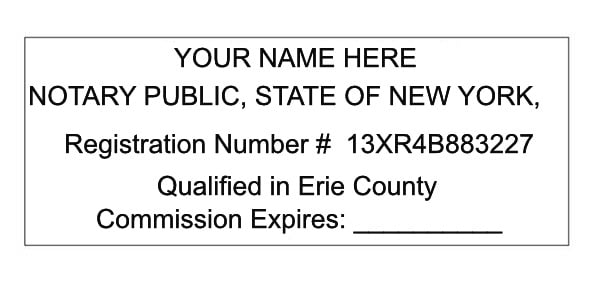-
Oct 23, 2024
-
Harrrison Carroll

The following article provides insights to what information should be on a New York Notary Stamp. A notary stamp, also known as a notary seal, plays a critical role in the notarization process, which serves to verify the authenticity of signatures on documents. This stamp provides essential information that establishes the authority and legitimacy of the notary public who has performed the notarization. Here’s a detailed overview of the information typically found on a notary stamp. You can learn more by visiting the New York Department of State. One can easily find where to get a document notarized. Banks, office supply store, and numerous other locastions provide notarial services.
Name of the Notary Public
The most prominent feature on a notary stamp is usually the name of the notary public. This name identifies the individual who is authorized to perform notarizations and ensures that the parties involved can reference the notary’s credentials. It is typically displayed in a clear and legible font, making it easy to read.
Title of Notary Public
Alongside the name, the title “Notary Public” is often included. This designation affirms the individual’s role and authority in the notarization process. Including this title is essential, as it distinguishes the notary from other professionals and indicates that they have met the requirements set by their state or jurisdiction.
State of Commission
Most notary stamps feature the name of the state in which the notary is commissioned. It is required in New York. This detail is significant because notary laws can vary from state to state. Including the state helps validate the notary’s authority and ensures that the notarization is legally recognized within that jurisdiction.
Commission Number
In New York, a notary stamp will also include a commission number. This unique identifier is assigned to the notary public when they receive their commission. It serves as an additional layer of verification, allowing anyone reviewing the document to confirm the notary’s status and legitimacy through the appropriate state authority.
Expiration Date
You must include the expiration date of the notary’s commission. This information is crucial because it indicates the timeframe during which the notary is authorized to perform notarizations. If the commission has expired, any notarizations performed after that date may not be considered valid. Here is a tip. When ordering a stamp, leave the expiration date blank. Then, when notarizing a document, fill it in by hand with black ink. This way, you will not have to buy a new stamp every 4 years, when you renew your commission. We have a blog article on this Notary Stamp Tip.
Additional Information on The New York Notary Stamp
Depending on local regulations, some notary stamps may contain additional information, such as the county of the notary’s commission or specific symbols that indicate the notary’s compliance with certain standards. However, this varies by jurisdiction and is not universally applicable. In New York, your stamp must show the county in which you are commissioned.
Usage in Documents
When a notary stamp is affixed to a document, it signifies that the document has been properly notarized. The presence of the stamp acts as a safeguard against fraud, ensuring that the signatures on the document are authentic and that the signers are who they claim to be. At Notary New York, we train people how to become a New York Notary.
Conclusion
In summary, a notary stamp is more than just an inked mark on a document; it encapsulates vital information that validates the authenticity of notarized transactions. Having the proper information on a New York Notary Stamp is crucial. By including details such as the notary’s name, title, state of commission, commission number, and expiration date, the stamp serves as a powerful tool for legal verification and protection against fraud. Understanding the components of a notary stamp is essential for anyone involved in the notarization process, as it underlines the importance of these legal formalities in ensuring the integrity of documents. We hope these insights provide the necessary information on the New York Notary Stamp.
Failure to comply with these rules could subject a notary to liability. We have a blog article on notary liability, which you may wish to read.
Comments are closed.